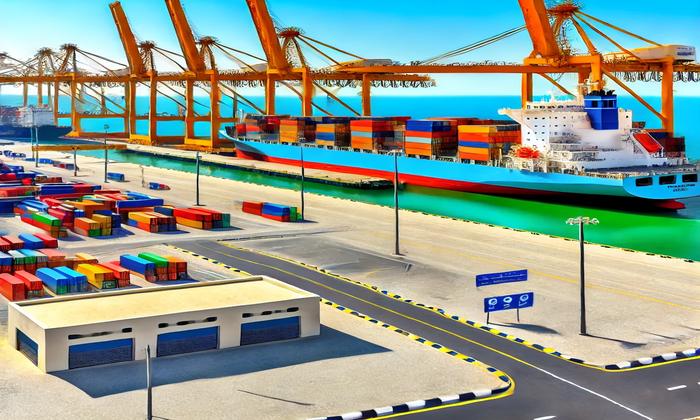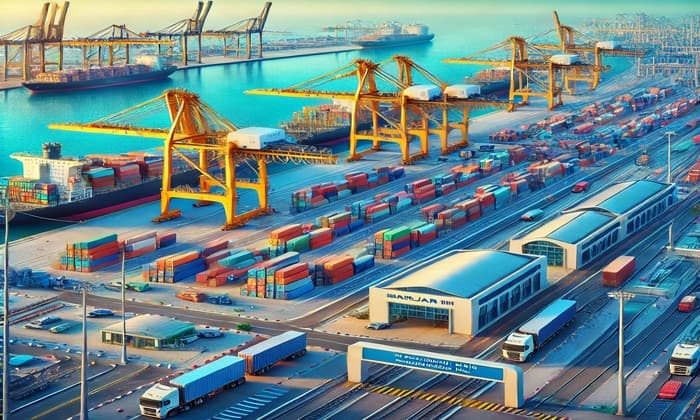
Jebel Ali Port: The Gateway to Global Trade and Logistics in Dubai
Jebel Ali Port, located in Dubai, UAE, is one of the largest and busiest ports in the world. Serving as a crucial hub for international trade, this port plays a vital role in connecting the Middle East with global markets. Known for its state-of-the-art facilities and strategic location, Jebel Ali Port is a key driver of economic growth in the region. In this comprehensive article, we will explore the technical aspects, operational efficiency, and the strategic significance of this world-renowned port.
Introduction to Jebel Ali Port
Jebel Ali Port, operated by DP World, is a cornerstone of Dubai’s maritime industry. The port was established in 1979 and has since grown into the world’s ninth-largest container port. It is strategically located at the crossroads of the East-West trade routes, offering unparalleled connectivity to over 150 ports worldwide. The port’s strategic importance is underscored by its role in facilitating the movement of goods between Asia, Europe, and Africa.
State-of-the-Art Infrastructure
One of the standout features of Jebel Ali Port is its state-of-the-art infrastructure. The port spans an area of over 134 square kilometers and boasts a quay length of more than 25 kilometers. This vast expanse allows the port to accommodate some of the world’s largest vessels, including Ultra Large Container Vessels (ULCVs). The port has 23 berths dedicated to container handling, with a total handling capacity of over 19 million TEUs (Twenty-foot Equivalent Units) annually.
The port is equipped with some of the most advanced container handling equipment, including ship-to-shore cranes, rubber-tired gantry cranes, and automated terminal systems. These technologies enable Jebel Ali Port to achieve high levels of operational efficiency, reducing turnaround times and enhancing cargo throughput. The port’s deep-water berths, capable of accommodating vessels up to 16 meters in draft, are a testament to its capacity to handle large-scale shipping operations.
Advanced Container Handling and Storage Facilities
Jebel Ali Port is renowned for its advanced container handling and storage facilities. The port features a fully automated terminal, known as Terminal 3, which is one of the most technologically advanced terminals in the world. This terminal uses automated stacking cranes and automated guided vehicles to manage the movement and storage of containers, significantly improving efficiency and reducing labor costs.
The port also offers extensive warehousing and storage options, including temperature-controlled facilities for perishable goods. These facilities are crucial for businesses involved in the trade of food products, pharmaceuticals, and other sensitive cargo. Additionally, the port provides specialized storage solutions for hazardous materials, ensuring that all cargo types are handled safely and in compliance with international standards.
Connectivity and Accessibility
The strategic location of Jebel Ali Port provides it with excellent connectivity and accessibility. The port is seamlessly integrated with Dubai’s extensive road network, including the Sheikh Zayed Road, which connects it to major industrial zones and free trade areas. This connectivity is a significant advantage for businesses looking to streamline their supply chain operations and reduce transportation costs.
Moreover, Jebel Ali Port is in close proximity to Al Maktoum International Airport, enhancing its multimodal transport capabilities. This proximity allows for the swift transfer of goods between air and sea, facilitating efficient logistics solutions for time-sensitive shipments. The port’s accessibility is further bolstered by its dedicated rail terminal, which connects it to the UAE’s Etihad Rail network, providing an efficient land transport option for cargo movement within the region.
Role in Global Trade and Logistics
Jebel Ali Port plays a pivotal role in global trade and logistics. As a major transshipment hub, the port facilitates the movement of goods between different regions, acting as a critical link in global supply chains. The port’s capacity to handle a diverse range of cargo types, including containers, bulk cargo, and roll-on/roll-off (Ro-Ro) vessels, underscores its versatility and importance in international trade.
The port’s strategic location in the UAE, a country known for its business-friendly environment and strategic geographical position, further enhances its role in global trade. The UAE’s robust legal and regulatory framework, combined with Jebel Ali Port‘s advanced facilities, makes it an attractive destination for businesses looking to establish a foothold in the Middle East.
Economic Impact and Contribution
The economic impact of Jebel Ali Port on Dubai and the UAE cannot be overstated. The port is a significant contributor to the country’s GDP, generating substantial revenue through port operations, logistics services, and trade activities. The port supports thousands of jobs, both directly and indirectly, and plays a crucial role in the economic diversification of Dubai.
Moreover, Jebel Ali Port is a key enabler of the UAE’s vision to become a global logistics and trade hub. The port’s continuous investment in infrastructure and technology reflects its commitment to maintaining its competitive edge in the global maritime industry. This commitment is evident in the port’s ambitious expansion plans, which aim to increase its handling capacity and further enhance its service offerings.
Sustainability and Environmental Initiatives
In line with global trends towards sustainability, Jebel Ali Port has implemented several initiatives to minimize its environmental footprint. These include energy-efficient technologies, waste management systems, and measures to reduce emissions from port operations. The port is also exploring the use of renewable energy sources, such as solar power, to further enhance its sustainability profile.
Jebel Ali Port is actively involved in initiatives aimed at protecting marine biodiversity and preserving the coastal environment. These efforts are crucial for maintaining the ecological balance in the region and ensuring that port operations do not negatively impact local ecosystems.
Future Developments and Expansion Plans
Looking ahead, Jebel Ali Port has ambitious plans for expansion and development. The port authorities have announced several projects aimed at increasing the port’s capacity and enhancing its operational efficiency. These include the construction of new berths, the expansion of existing terminals, and the introduction of advanced digital technologies.
One of the most significant projects is the development of the Dubai Maritime City, a dedicated maritime zone that will house shipyards, dry docks, and other maritime-related industries. This development is expected to further strengthen Dubai’s position as a global maritime hub and provide additional facilities for businesses operating at Jebel Ali Port.
Conclusion
Jebel Ali Port is not just a maritime gateway; it is a cornerstone of Dubai’s logistics and trade sectors. With its world-class infrastructure, strategic location, and commitment to excellence, the port is well-positioned to continue its role as a key player in global trade. Whether you’re a business owner, a logistics professional, or simply curious about the port’s operations, Jebel Ali Port offers a compelling case for why it remains one of the most important ports in the region.
Explore the opportunities Jebel Ali Port has to offer and discover how this dynamic hub can help you achieve your business goals. For more information or to arrange a visit, please contact the port’s customer service team or visit their official website.






